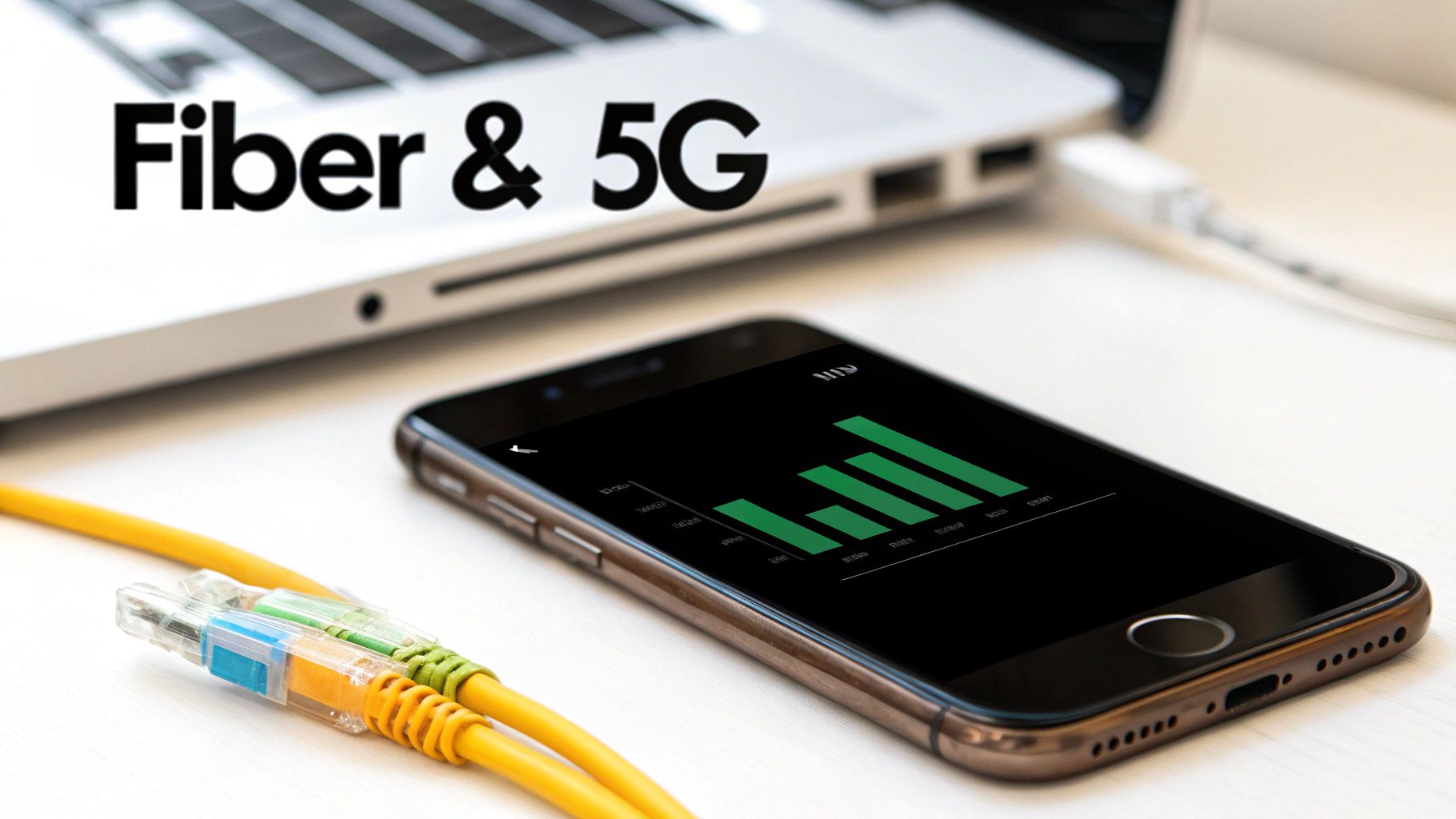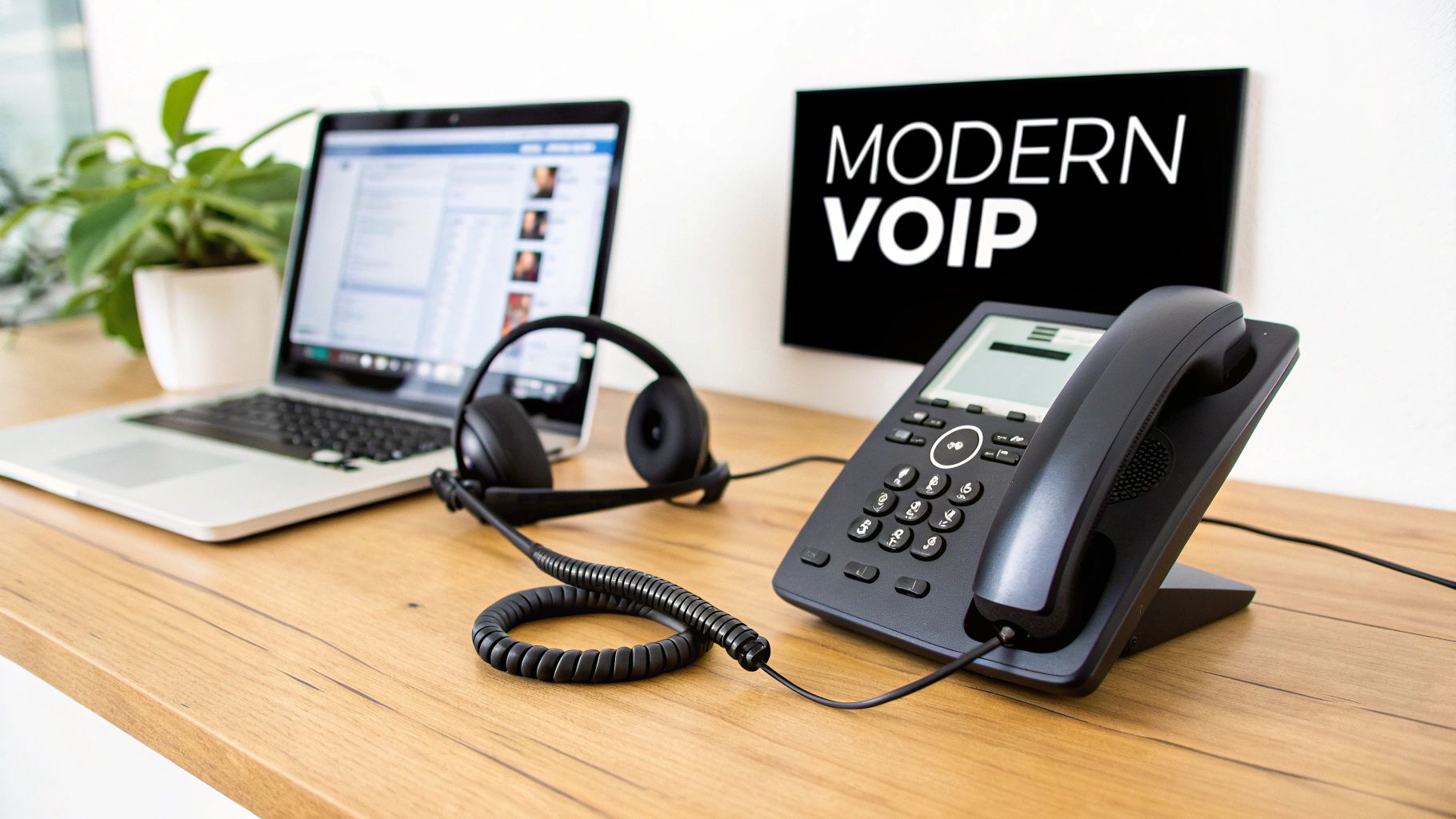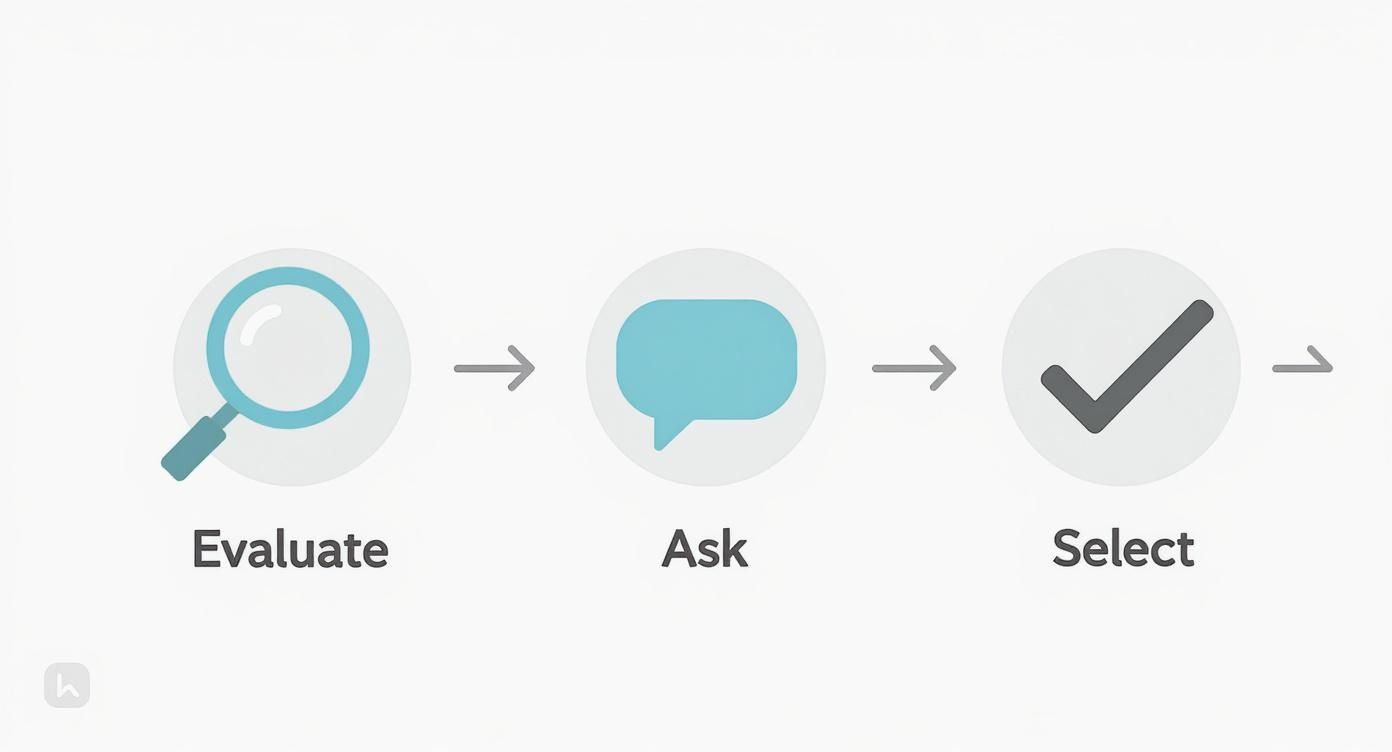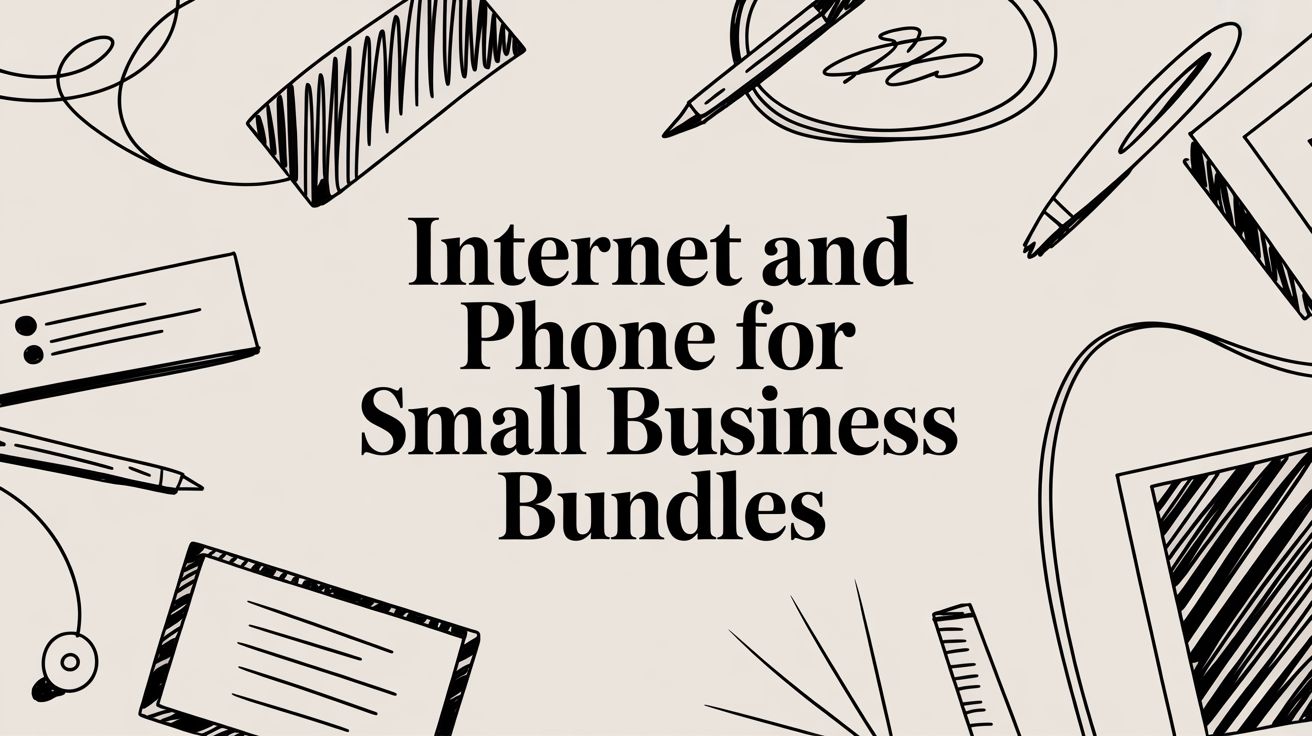Choosing the right internet and phone for small business isn't just an IT task—it's one of the most important decisions you'll make for your company's growth. Think of your connectivity as the central nervous system for your entire operation. It's what powers every customer conversation, every cloud app, and every single sale you make.
This guide is here to help you pick a communications bundle that gives you the solid reliability and easy scalability your business needs to win.
Why Your Business Needs a Strategic Communications Plan

In today's fast-paced world, dependable connectivity isn't just a "nice-to-have"—it's the engine that drives your business forward. A sluggish internet connection or a clunky, outdated phone system just gets in the way, frustrating both your team and your customers and hurting your bottom line.
On the flip side, a powerful and stable system gives you a real competitive edge. The right internet and phone service is like having a storefront in the perfect location. It makes it easy for customers to find you, helps your team serve them effectively, and keeps your internal operations running smoothly.
The Modern SMB Is a Digital Business
Let's be honest, the line between a "digital" business and a "traditional" one has basically disappeared. Just about every small business out there relies on a whole suite of online tools to get work done. This makes having a rock-solid plan for your internet and phone for small business absolutely critical.
Your day-to-day operations probably lean heavily on things like:
- Cloud-Based Software: Your most important tools, from QuickBooks Online for accounting to Asana for project management, all live on the internet.
- Customer Relationship Management (CRM): You need constant, reliable access to systems like Salesforce or HubSpot to keep track of leads and manage customer information.
- Digital Payment Processing: Whether you're selling online or in-person, you can't process credit cards or other digital payments without a steady internet connection.
- Online Marketing and Sales: Your website, social media pages, and e-commerce store are your main ways of reaching new customers.
This isn’t just a feeling; the numbers back it up. Small businesses that use the internet to connect with customers and suppliers see their transaction costs drop significantly. In fact, around 26% of small enterprises and 34% of medium-sized businesses are already using e-commerce and other digital services to reach their markets.
Unlocking Growth with Better Connectivity
Upgrading your communications isn't just about fixing what's broken; it’s about opening up new opportunities for growth and making your business more efficient. By choosing the right services, you can empower your team and deliver a much better experience for your customers. You can find more resources for connecting your small business that explore this topic in greater detail.
A modern system helps you:
- Support Hybrid and Remote Work: Give your team the tools they need to be productive anywhere, with crystal-clear video calls and quick access to company files.
- Improve Customer Service: Use advanced phone features like auto-attendants and smart call routing to make sure customers get to the right person, right away.
- Increase Operational Efficiency: With faster speeds, your team wastes less time waiting for files to download or apps to load, which adds up to a big boost in productivity.
This guide will break down technologies like Fiber, 5G, and VoIP in simple terms, giving you a clear roadmap to make a smart decision that will benefit your business for years to come.
Understanding Your Business Internet Options

Choosing the right internet for your company is a lot like picking the right vehicle for the job. You need something powerful enough for the daily grind, reliable enough for the long haul, and efficient enough that it doesn't break the bank.
Let's look at the two top contenders for a modern internet and phone for small business setup: Fiber Optic and Business 5G/LTE. Each has its own strengths, and figuring out which one fits your business ensures everything runs smoothly, without those frustrating slowdowns or costly outages.
The Gold Standard: Fiber Optic Internet
When businesses look for the absolute best connection, they turn to fiber optic internet. Think of it as your own private, multi-lane superhighway built exclusively for your data. Unlike older cable or DSL connections that push data through copper wires, fiber uses incredibly thin strands of glass to transmit data as pulses of light.
What does that mean for you? Blazing speed and rock-solid consistency. For a small business, this translates to crystal-clear video calls, large files that upload to the cloud in a flash, and zero slowdowns, even when the whole team is online. It’s the high-performance foundation you need. You can dive deeper into the technical advantages in our guide explaining why fiber is superior to cable internet.
One of the biggest game-changers with fiber is its symmetrical speeds. Simply put, your upload speed is just as fast as your download speed.
- Downloading is when you pull data from the internet, like loading a webpage or streaming a training video.
- Uploading is when you send data to the internet, like joining a video conference or backing up critical files.
For any modern business, fast uploads are non-negotiable. Symmetrical speeds eliminate bottlenecks and keep your team collaborating without a hitch.
The Flexible Powerhouse: Business 5G and LTE
Business 5G/LTE is a potent wireless technology that delivers high-speed internet using the same robust cellular networks as your smartphone. Instead of a physical cable running into your building, a small receiver simply picks up a signal from a nearby cell tower.
This makes it an incredibly versatile solution. For businesses located where fiber isn't available yet, Business 5G can be an excellent primary connection, delivering speeds that leave older tech like DSL in the dust.
But Is It Reliable?
It's a fair question. While we associate wireless with our mobile phones, business-grade 5G/LTE services are built specifically for commercial use. They offer far greater reliability and performance than a simple mobile hotspot and can easily serve as a dependable primary internet source.
Business 5G/LTE also shines as a backup internet solution. If your primary fiber connection ever goes down, your network can automatically switch over to the 5G/LTE connection. This seamless failover keeps your point-of-sale systems, cloud apps, and VoIP phones running, preventing downtime from hurting your bottom line.
Comparing Internet Technologies for Your Business
To make the best choice, it helps to see how these options stack up side-by-side. This table compares Fiber, Business 5G/LTE, and traditional Cable/DSL based on the factors that matter most to your daily operations.
| Feature | Fiber Optic | Business 5G/LTE | Cable/DSL |
|---|---|---|---|
| Primary Benefit | Unmatched speed & reliability | Flexibility & excellent backup | Wide availability |
| Speed | Highest available, symmetrical uploads/downloads. | Fast, often exceeding older wired tech. | Asymmetrical (fast download, slow upload). |
| Reliability | Extremely high, less prone to interference. | Strong, dependent on signal strength. | Moderate, can be affected by network congestion. |
| Latency | Very low, ideal for real-time apps (VoIP, video). | Low to moderate. | Higher, can cause lag in real-time communication. |
| Best For | Data-heavy operations, VoIP, cloud software. | Primary in non-fiber areas, or as a failover. | Basic internet use where other options are limited. |
Ultimately, the "best" connection depends entirely on your needs. Fiber is the clear winner for performance, while 5G/LTE offers unmatched flexibility and a crucial safety net.
Key Concepts: Symmetrical Speeds and Latency
We've talked about symmetrical speeds, but another critical term to understand is latency.
Latency is the delay it takes for data to travel from your computer to a server and back. In simple terms, it's the "lag" you might experience. For real-time applications, low latency is everything.
- High Latency looks like: That awkward pause on a VoIP call after you speak but before the other person hears you.
- Low Latency looks like: Clicking a button in your cloud inventory software and seeing the system respond instantly.
Fiber optic connections are famous for their incredibly low latency, which is why they are the top choice for businesses relying heavily on VoIP, video conferencing, and other real-time cloud tools.
The need for better, faster connectivity isn’t slowing down. Today, global internet usage has hit 68.8%, and 5G coverage now reaches 51.6% of the world's population. With average U.S. broadband speeds reaching 231.1 Mbps, it’s clear that businesses need robust connections to keep up with modern demands.
Upgrading to a Modern VoIP Phone System

If your business is still hanging on to a traditional landline, you're not just using old technology—you're missing out. It’s like trying to run your business with a flip phone in a smartphone world. It gets the job done, but you’re missing a whole suite of tools that could make your life easier and your business more professional.
The modern way forward is Voice over Internet Protocol (VoIP). Instead of relying on aging copper wires, VoIP routes your calls right over your internet connection. Think of it less like a phone line and more like a powerful, cloud-based communications hub that you can access from anywhere. It's a simple switch that turns a basic utility into a real asset for your business.
More Than Just a Dial Tone
VoIP is about so much more than just making and receiving calls. Because it’s software-driven, it unlocks a ton of features that were once only available to massive corporations with huge IT budgets. Now, any small business can project a polished, professional image.
Here are just a few of the game-changing features you can expect:
- Auto-Attendant: Your own virtual receptionist to greet every caller and professionally direct them. ("Press 1 for Sales, Press 2 for Support.")
- Smart Call Routing: Never miss an important call again. Automatically forward calls to your cell phone or another device when you’re away from your desk.
- Voicemail-to-Email: Get your voicemails delivered as audio files (and even text transcripts) straight to your inbox. Easy to save, forward, and act on.
- Unified Communications: Pull everything together. Integrate your phone system with video conferencing and messaging for a seamless workflow.
With a modern phone system, you ensure every customer interaction is smooth and efficient. It’s about creating a great first impression, every single time.
The Connection Between VoIP and Your Internet
Here's the most important thing to remember: since VoIP runs over the internet, your call quality is completely dependent on your internet quality. A spotty, slow connection means choppy audio, dropped calls, and headaches for both your team and your customers.
This is exactly why bundling your internet and phone for small business with one provider is such a smart move. A high-quality fiber internet connection is the perfect foundation for VoIP. Fiber's low latency gets rid of those awkward conversational delays, while its equal upload and download speeds ensure your voice is crystal clear. Your internet connection isn't just a line item—it's the backbone of your entire communication strategy.
And in today's world, that digital backbone is more critical than ever. With 27.2% of all business in the U.S. now conducted online, a reliable, high-speed connection has become non-negotiable for everything from sales calls to customer support. You can dive deeper into this digital business transition from IbisWorld.
Supporting the Modern Workforce
VoIP is tailor-made for the way we work now. With remote and hybrid teams becoming the norm, VoIP frees your employees from being tied to a physical desk. They can make and receive calls from your main business number on any device, no matter where they are.
This flexibility is a massive competitive advantage. An employee can be at home, on the road, or in the office and stay completely connected. They can use a desktop app, a mobile app, or a physical VoIP phone, all while presenting a consistent, professional front for your company. You can even add features like branded calling ID for business voice to make your company's name and logo show up on caller IDs. This agility helps you attract top talent and keep your business running smoothly, wherever your team happens to be.
How to Choose the Right Provider and Bundle
Picking the right provider for your business internet and phone isn't just about finding the lowest monthly price. That rock-bottom deal can turn into a huge expense fast if it means dropped calls, frustrating downtime, and lost sales. The best provider acts more like a partner, giving you the solid reliability, security, and support you need to run your business smoothly.
Making the right call means looking beyond the sticker price. You need to really dig into the guarantees they offer, how they plan to protect your data, and what happens when you actually need their help. Let’s walk through how to evaluate providers so you can make a choice that actually strengthens your business.
Decoding Service Level Agreements
A Service Level Agreement (SLA) is your provider's written promise to you. It's one of the most important documents you'll sign, laying out exactly what they guarantee about their service performance. Think of it as the warranty for your business's connection to the world.
The number one metric to look for is uptime, which you’ll see as a percentage like 99.9% or 99.99%. They might look almost the same, but that tiny difference can have a huge impact on your operations.
- 99.9% Uptime: This allows for up to 8.77 hours of potential downtime per year.
- 99.99% Uptime: This allows for only 52.6 minutes of potential downtime per year.
For any business where being online is critical, that's a massive difference. A good SLA will also spell out exactly what happens if they don't meet their promise, which usually means getting service credits on your next bill.
Evaluating Security and Support
With cyber threats always lurking, your provider's security measures are absolutely essential. Don't just take their word for it—ask them specific questions about how they keep your communications and data safe.
Here are a few key security features you should be looking for:
- Network Protection: Does the provider include built-in protections like firewalls and DDoS (Distributed Denial of Service) mitigation? This helps stop attacks before they ever get to you.
- Call Encryption: For your VoIP phone system, make sure all calls are encrypted. This prevents anyone from listening in on sensitive client conversations.
- Data Safety: Ask how they secure your account information and any other sensitive data they have on file.
Just as important is the quality of their support. When something goes wrong, you need quick, helpful answers from people who know what they're doing. Before you sign anything, find out if they offer 24/7 business-dedicated support and check what their average response times are.
A provider's true value isn't just in the service they deliver, but in the support they provide when things go wrong. Prioritize partners who invest in a knowledgeable, accessible, and US-based support team.
The Pros and Cons of Bundling
Most providers will offer you a discount if you bundle your internet and phone services together. This is usually a great way to save money, but you need to weigh the pros and cons. Bundling makes life easier with one monthly bill and a single company to call for support.
The main thing to watch out for is service quality. A provider might have amazing fiber internet but a clunky VoIP system, or the other way around. The convenience of a bundle is only worth it if both services are top-notch and meet your business's needs. Always check out the quality of each service on its own before you commit to a package deal.
Key Questions for Potential Providers
Before you make a final decision, it’s a good idea to have a conversation with potential providers. Use this checklist to make sure you cover all the important bases. How they answer these questions will tell you a lot about their service and how much they value their business customers.
Key Questions to Ask Potential Service Providers
| Category | Essential Question | Why It Matters |
|---|---|---|
| SLA & Reliability | Can you provide a copy of your SLA, and what are the specific uptime guarantees and service credits? | This confirms their commitment to reliability and shows you exactly what compensation you'll receive for downtime. |
| Security | What specific security measures, like firewalls and call encryption, are included with your business plans? | This ensures your data, communications, and operations are protected from common cyber threats. |
| Customer Support | Is your business support team available 24/7, and what are your target response and resolution times? | Problems don't just happen during business hours. You need to know you can get expert help whenever you need it. |
| Installation | What does the installation process involve, and what are the typical timelines from signing to service activation? | Understanding this helps you plan the transition and minimize any potential disruption to your business operations. |
| Contracts | What are the contract terms, and are there any penalties for early termination or options for scaling service up or down? | This clarifies your long-term commitment and ensures you have the flexibility to adapt as your business needs change. |
Getting clear answers to these questions will give you the confidence you need to choose a provider that will be a true asset to your business for years to come.
A Smooth Transition to Your New System
Choosing your new internet and phone service is a huge step forward, but the real work starts when it's time to get everything installed and running. A well-thought-out transition is what separates a seamless upgrade from a week of total chaos. The goal is simple: switch over with as little disruption as possible so your team can get right back to work.
Think of it like moving into a bigger, better office. You wouldn't just toss everything in a truck and hope for the best. You'd label boxes, coordinate with movers, and have a clear plan for where everything goes. Migrating your internet and phone for small business needs that exact same strategic approach.
Pre-Migration: Your Strategic Checklist
Before a single piece of new hardware shows up, a few key moves will set you up for a pain-free installation. This is all about getting your ducks in a row—gathering info, prepping your space, and getting your team ready.
First off, do a quick audit of what you've got now. How many phone lines are you actually using? Who on your team needs a new desk phone? Getting a clear picture of your current setup makes it much easier to map out your new one.
Next, you need to handle your existing phone numbers. The process of moving your numbers from the old provider to the new one is called number porting. You absolutely need to get this started early, as it can take a few days to complete. Your new provider will walk you through it, but here's the golden rule: do not cancel your old service until that port is 100% finished.
Finally, get your office space ready. This could be as simple as figuring out the best spot for the new router or making sure you have enough network jacks for all the new VoIP phones. A little bit of prep work now saves a lot of headaches on installation day.
To see how the selection process leads up to this point, this simple three-step flow breaks it down.

This just goes to show that a methodical approach—from evaluation all the way to selection—is what lays the foundation for a successful switch.
Deployment and Training
With your plan locked in, it’s go-time. This is where we move from planning to action, getting your new system configured and making sure your team knows how to use it.
Here’s a step-by-step game plan for a smooth rollout:
- Network and Hardware Setup: Your provider will usually handle the physical installation of the internet connection and any new gear like routers or VoIP phones.
- Software Configuration: This is where you bring the phone system to life. You’ll work with your provider to set up your auto-attendant greeting ("Press 1 for Sales…"), call routing rules, and individual voicemail boxes.
- Employee Training: A powerful new system is useless if no one knows how to use it. Schedule a quick training session to show everyone how their new phones work, how to get voicemail-to-email, and how to use any cool new mobile or desktop apps.
- Thorough Testing: Before you officially "go live," test everything. And I mean everything. Make calls out, have people call in, test every option on the auto-attendant, and double-check that calls are forwarding correctly.
Don't rush the testing phase. A few hours spent making sure every little thing works as it should can save you from a massive headache during your busiest time of day.
Consider Managed Network Services
For a lot of small businesses, the idea of managing network equipment, security, and constant updates is a huge time-sink. This is where Managed Network Services can be a real game-changer.
By outsourcing your IT management, you’re basically handing the technical heavy lifting over to the experts. They monitor your network 24/7, handle security protocols, and take care of all the updates so you don't have to. It's a smart way to get enterprise-level IT support without the hefty price tag of an in-house team, letting you focus on what you do best—running your business.
Future-Proofing Your Business Communications
Picking the right internet and phone service isn't something you can just check off your to-do list. It’s a serious investment in your company's future. The decisions you make today are laying the groundwork for where your business will be next year, and even five years from now.
The main takeaway is simple: your technology has to match your business goals. A cheap internet plan might save a few bucks today, but it can quickly become a bottleneck that chokes your growth when you need to bring on more people or use new cloud software. Your communication system should be an asset that's ready to grow right alongside you.
Planning for Scalability and Growth
As your business gets bigger, what you need from your communications will naturally change. A scalable internet and phone for small business package lets you adapt without having to rip everything out and start over—a painful and expensive process. This means thinking ahead about what your business might look like down the road.
Are you planning on:
- Hiring more staff? You'll need an internet plan with enough bandwidth to keep everyone working smoothly, without slowdowns.
- Adding new locations? A cloud-based VoIP system makes it incredibly easy to connect a new office or shop to your existing phone network.
- Integrating new tools? Look for phone systems that play well with your CRM or other software to help automate tasks and make your team more efficient.
The right communication infrastructure is more than just another bill; it's a competitive advantage. It’s the engine that keeps your operations running smoothly, improves customer service, and sets you up for steady, long-term growth.
Your Foundation for a Competitive Edge
When it comes down to it, the right tech helps you serve your customers better and run your business more effectively. A fast, reliable fiber connection means your team can collaborate without hiccups, while a modern VoIP system ensures you sound professional to every single caller. These tools aren't just about keeping the lights on—they're about building a business that's tough, nimble, and ready for anything.
By investing wisely in your communications, you’re not just buying a dial tone or an internet connection. You're building a solid foundation that supports every other part of your business, giving you the stability and flexibility to win in a competitive world.
Frequently Asked Questions
Figuring out the right internet and phone service for your business can feel overwhelming. We get it. Here are some straightforward answers to the questions we hear most often from small business owners.
How Much Internet Speed Does My Small Business Really Need?
The honest answer? It really depends on what your team does all day. A good starting point for a few employees doing basic email and browsing is around 10 Mbps per person. But that’s just the beginning.
If your team lives in cloud apps, spends half the day on video calls, or sends large files back and forth, you’ll want to aim higher—think 25 Mbps per employee. For creative shops, architects, or anyone pushing massive design files around, you should be looking at 50+ Mbps per employee. It's always smart to get a little more than you need today to make room for growth tomorrow. A fiber connection with symmetrical speeds is a game-changer for any business that uploads just as much as it downloads.
Can I Keep My Business Phone Number if I Switch to VoIP?
Absolutely. In nearly every case, your phone number is yours to keep. The process is called "number porting," and federal rules ensure your old provider has to release your number when you switch.
Just know that it's not an instant flip of a switch; it can take anywhere from a few days to a couple of weeks. Your new VoIP provider handles all the technical legwork, but you have one very important job: do not cancel your old phone service until the port is 100% complete and confirmed. This is the golden rule to guarantee you don't lose your number or have any service gaps.
Porting your number is a standard and safe procedure. A quality provider will handle the technical details, ensuring a smooth transition so your customers never notice a change.
What Is the Difference Between Business and Residential Internet?
While they might use the same fiber or 5G technology, business and home internet are built for completely different worlds. Business plans are all about reliability and come with guarantees that residential plans simply don't have.
Here’s what sets them apart:
- Service Level Agreements (SLAs): Business plans come with a written promise for uptime, like 99.99%, and you get credits if that promise is broken. Home internet comes with no such guarantee.
- Prioritized Support: When your internet goes down, every minute costs money. Business customers jump to the front of the line with dedicated support teams to get you back online fast.
- Static IP Addresses: A must-have for hosting a server, running a secure VPN, or many other business-critical apps. This is a standard feature on most business plans.
- Enhanced Security: Business internet often includes stronger, built-in security to help protect your company's network and sensitive data from online threats.
Bottom line: running your company on a residential internet plan is a risky bet. Those business-grade features are what keep you operational and secure.
Ready to build a reliable communication foundation for your business? The experts at Premier Broadband can help you design a customized internet and VoIP package that fits your exact needs. Explore our business solutions today!
Article created using Outrank

